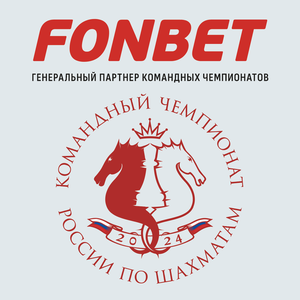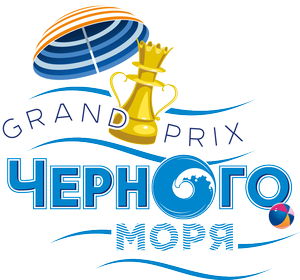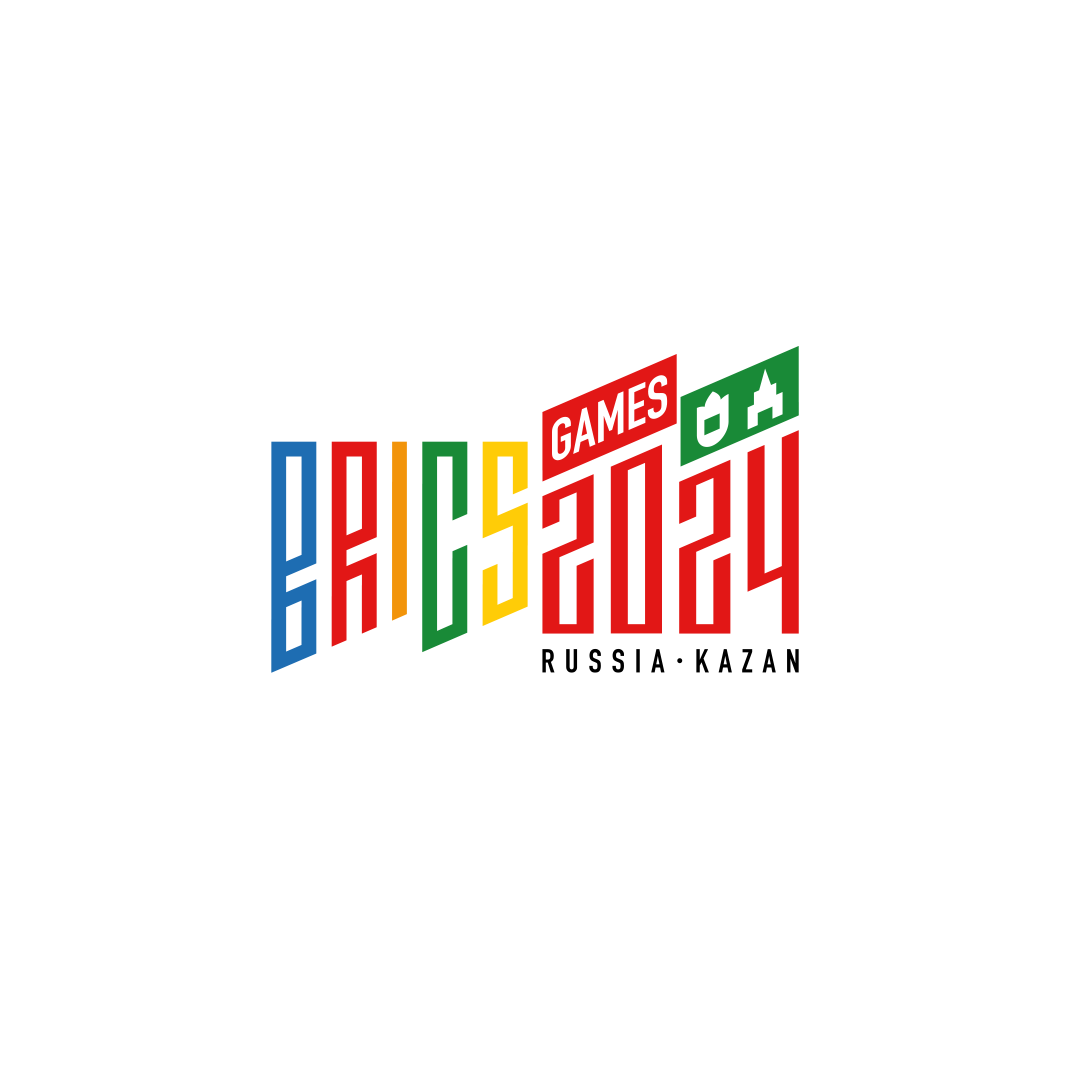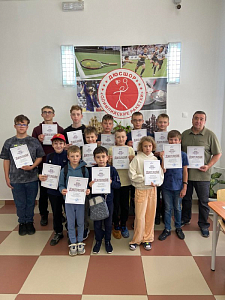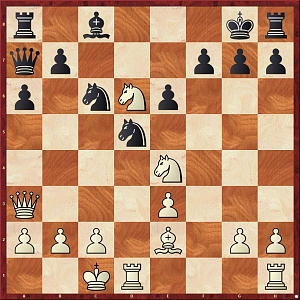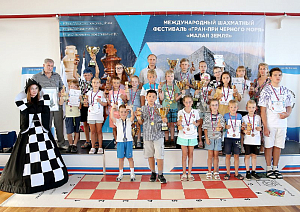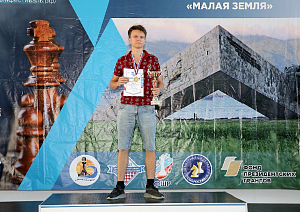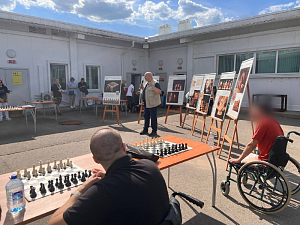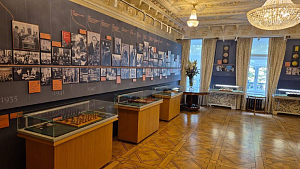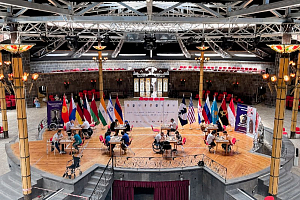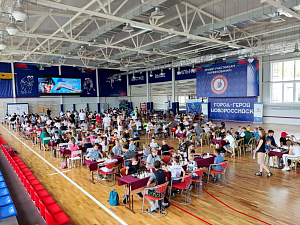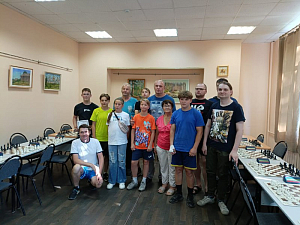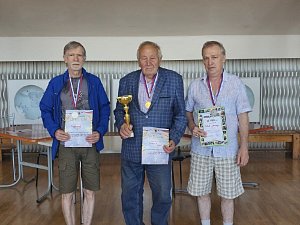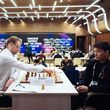Ian Nepomniachtchi: I Didn't Think Much About Final Standings
The 2020 Russian champion's interview to Vladimir Barsky
– Ian, congratulations on winning the Superfinal! What was your prime mover to participate in this tournament in these challenging times?
– The Candidates Tournament is clearly the main event, which has been suspended for a year. After the quarantine was imposed, one could play only on the Internet, but it is sometimes useful to sit at the board and touch pieces with your hands. Well, I participated in a few training sessions and we used wooden boards and pieces. However, I don't think that a one-year break does you any good.
I decided to play because the Superfinal is a key tournament, at least in terms of the title at stake. The prizes aren't that big, but it is the title that carries a lot more value. Besides, when agreeing to participate, I hoped – given that the tournament was to be held in Moscow, and not elsewhere in the vast expanses of our immense homeland – that it would gather a stronger lineup. I did hope that Sasha Grischuk and Evgeny Tomashevsky, and Dmitry Andreikin would be there as well. However, not everyone could or wanted to take part.
First of all, I wanted to practice. I got off to a good start, and it put wind into my sails, but it was clearly far from plain sailing. It felt unusual to play over-the-board! During the preceding six months, I got used to... not that it is necessarily a good thing, but I got used to sitting at home in front of my computer and playing chess using my mouse.
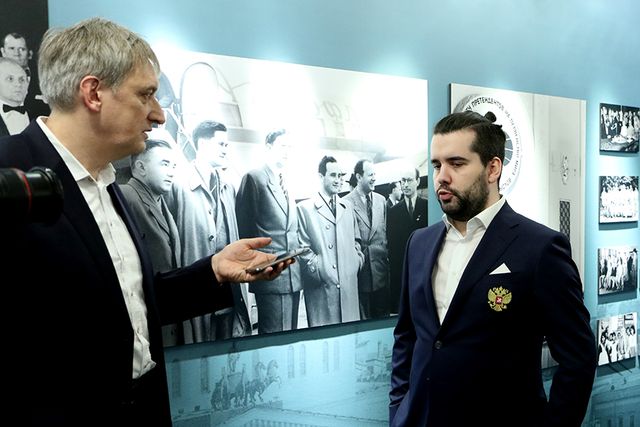
– Were you not fed up with endless online tournaments during the quarantine?
– What do you mean fed up with? There is such a thing as a habit. It is more habitual to play chess over-the-board than on the Internet. Since childhood, I've been playing on the Internet, but it has never been a tournament or an official competition, so it opened a door into some new experience. When this whole story began in April-May, it was hard to adapt to new realities because I partially rate playing on the Internet (on a subconscious level, probably) as an easy-going chess approach.
– As entertainment?
– Well, they still pay well for this entertainment! Tournaments with large prize pools and powerful opponents is also a good enough incentive to concentrate and play seriously. I decided to give a more serious approach to my games against Magnus. It is not that you sit home watching a movie and then you get up and go to play… It takes preparation as if it were a regular tournament round, with the only difference that you are not in a tournament hall, but at home in front of your computer.
– In the Superfinal, live chess had some new aspects to it, such as screens, sanitizers, wearing masks… Was it very distracting, or do you not pay attention to such things when you start playing?
– At first, I thought that there was a hazard of knocking down the screen! As for sanitizers, masks, and other things… Apparently, I was one of the "pioneers," because even if we did not play wearing masks at the Candidates Tournament in Ekaterinburg, there were sanitizers everywhere, and it were referees, security guards, and waiters who wore masks.
– There were no handshakes…
– Yes, handshakes were to your discretion there, as well as here. OK, I hope this will all be over at least by next year's summer. The usual smooth course of events is much more desirable.
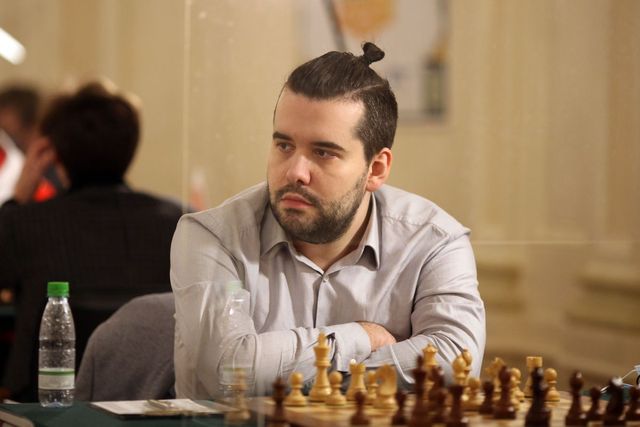
– In Moscow, Mikhail Antipov tested positive in the middle of the event. Did it affect the mood?
– Of course, it did. I think it affected everyone. For me, the tournament split into "before" and "after". I offered to discuss the situation with all the participants before starting round 7 (that is, not because I wanted to fix the first place). It is one thing to make a hypothetical assumption at the start that someone might get sick, and another to see it happen in real life; it seemed no laughing matter at all to me. I wanted to gather some kind of meeting where we could discuss what we were doing next. I would have probably been satisfied even with some strong-willed decision… As a result, the participants were interviewed, and lack of agreement between comrades is not unusual in such cases: the voiced opinions differed, and the tournament continued.
On the other hand, it's good that we finished the tournament. We were lucky to have no more problems. However, this situation burned a lot of energy and nerves.
– If the Superfinal would have "suspended," just as the Candidates Tournament did, this, too, would not amount to nothing good, right?
– Of course, everyone wanted to finish it; on the other hand, I think it was possible to sum up the results after half the tournament or consider it cancelled. Any decision would have had some validity to it.
– What goals did you set for yourself when going into the tournament?
– I set such priorities for the Superfinal: 1) finish without upsets, 2) gain some practice and 3) not drop the rating points. I didn't think much about the final standings. I realized that if I would not lose my rating or even gain some, it would be a rather significant "asset" for the final standings, which would certainly be enough to make into the top three, and maybe for the first place even. This is what happened in reality, after all.
The tournament was very testing. It is very beautiful in the Central House of Chess Player, of course: an elegant Christmas tree, beautifully decorated halls, but the overall atmosphere across the world and in Russia does not contribute to the creative process. The home stretch of the tournament required a lot of energy and will-power. On the last day, I really wanted that there be no draw in the competitor's game – so that Sergey Karjakin either won or lost, just to do without a tie-breaker.
– Playing white in the last round, Maxim Chigaev began repeating moves already in the opening. Were you surprised by this decision? Was there no intention to sidestep it and continue the fight?
– Maxim did well in the tournament and contested the highest places, but he was obviously discouraged by the defeat in the 10th round from Alexey Goganov, the tailender. Apparently, Chigaev was not ready to put up any fight with me. And Black may find it quite challenging to play for a win in a sharp style, and success is by no means guaranteed. I considered it more appropriate to save my breath for a possible tie-breaker, so I would not break lances. All in all, everything ended well for me.
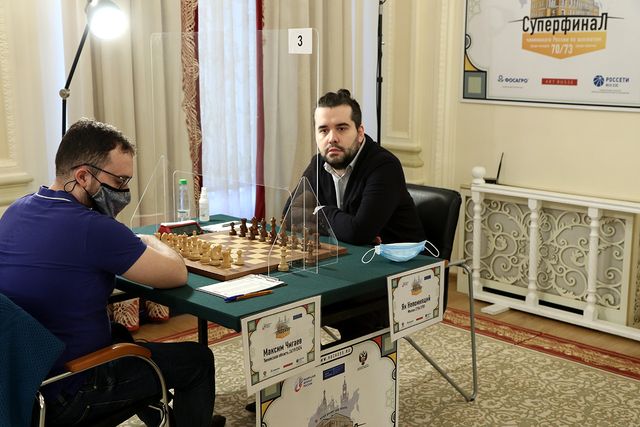
I want to praise the superb efforts of my team – Vladimir Potkin and Ildar Khairullin. We managed to predict the upcoming games' openings, and some of those wins took place in the opening indeed. So, I owe them many thanks!
– Which of your games are you particularly happy with?
– It's hard to say – there were a lot of interesting combative games. I would have been delighted with the fight against Andrey Esipenko, if I had found a checkmating idea in the endgame.
%20(1).jpg)
I understood that I needed to give every move a thought, but my reasoning that 27. Rxb7 hardly spoiled anything was based on general considerations, so it took me only a few minutes to make it. While Andrey was thinking, I thought over this position for a long time, because 25...Kg6 is relatively easy to make, and I was just trying to understand what would happen after 26.h5+ Kg5. However, I did not succeed with 27.Rxb7 and squandered all my advantage; fortunately, I managed to win the game when given yet another opportunity.
– Did Esipenko's home preparation finish earlier than yours?
– To be honest, judging by the time spent, he probably tried to recall the computer line, but after 19...f6 he was on uncharted territory, most likely.
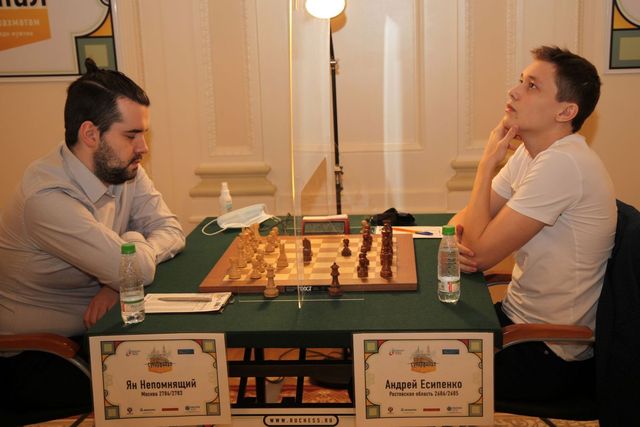
– Was the winning move 27.Rd3 recorded in your file?
– I have already "let go of" this game. I only learned that 27. Rd3 was winning. It's a shame that I failed to find a win; on the other hand, this is not the most trivial move. Unfortunately, I didn't delve into the position at the right moment. I decided that I should look for a study-like solution, but I thought that throwing in 27.Rxb7 would definitely not do White any harm. However, it turned out that this natural move allowed Black bailing out in the rook ending. Andrey failed to draw the game though, but that's another story.
– Could you highlight any other games?
– I had a very principled game against Sergey Karjakin. Going into the tournament, I considered him the main competitor, and the course of events did confirm this consideration. In a relatively fresh line, my assistants and I managed to discover a new idea – this is always a pleasure, especially now, when many openings have been studied far and wide. A new idea, a new maneuver of your pieces, and then I managed not to spoil anything.
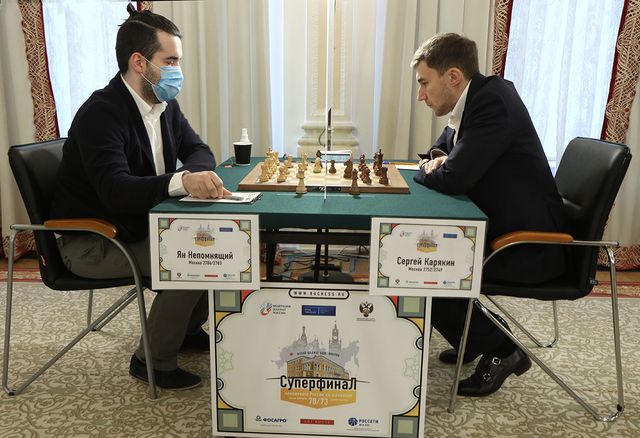
– It was not so long ago that elite grandmasters (owing to Carlsen, perhaps) would often sidestep the mainline theory. By contrast, in the Superfinal we saw many fierce opening duels and killing opening ideas. Is the trend about to change?
– I think it has more to do with the fact that for many of us it happened to be the first classical tournament in a year or at least in six months. There are a certain number of "bullets" that can be put to use. Many participants surely continued to work hard enough during this period, and managed to show up with something up their sleeves. It is much more challenging to offer something new when you have just finished one tournament and have to go for another in a week. Then at some point you try to play so as to avoid more stress.
On the other hand, such considerable baggage of home prep sometimes produces the opposite effect. Many knowledge – many sorrows! Before the game with Dubov, I repeated the line that we eventually had during the game. I came to the Central House of Chess Player and realized that I knew for sure that I had analyzed this position, but I had not idea how to play it. And I didn't manage to rearrange myself – to make some logical moves over the board. Instead, there followed two mistakes, as a result of which an equal position (equal in several ways) turned into a hopeless one. This is also known to happen.
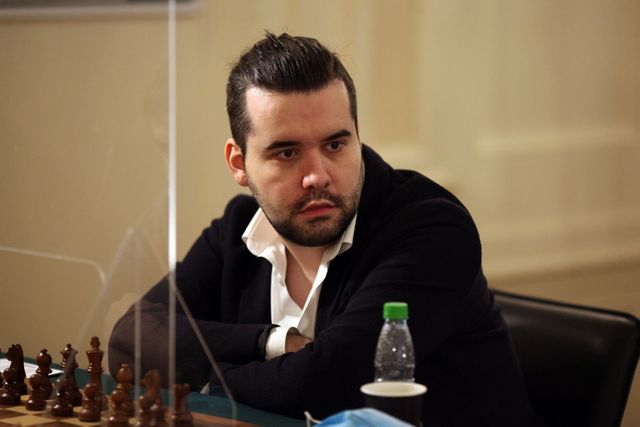
– Do you plan to play in Wijk aan Zee in January?
– As far as I understand, a lockdown has been introduced in the Netherlands that lasts until January 19, so there are doubts as to the tournament taking place at all. Wijk aan Zee is in any case a very demanding tournament, even more so given the current circumstances. If you do not enjoy playing chess, then this long competition always turns into torture, and here we have such clearly aggravating circumstances.
– Ian, thank you for the interview, and I wish you a Happy New Year!
– Thank you! I would also like to congratulate all chess fans and express the hope that the new year will be easier than this one, that everything will somehow come back to normal. I wish all of you health and happiness. Let good luck be with us, and let the right moves suggest themselves to us over the board!
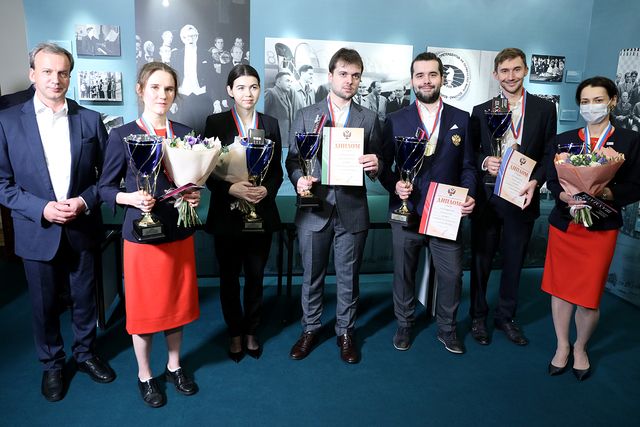
Pictures by Vladimir Barsky and Eteri Kublashvili









